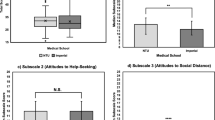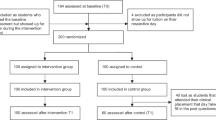Abstract
Objectives
Medical students have been shown to have high levels of psychological distress, including self-stigmatization and unwillingness to seek care. The authors hypothesized that a student-led curriculum involving personal mental illness experience, given during the first-year neuroscience course, and titled “Mental Illness Among Us (MIAU), ” would reduce stigma of mental illness.
Method
In 2010 and 2011, students completed voluntary pre- and post-MIAU surveys measuring attitudes regarding mental illness in relation to MIAU. Also, in 2011, the authors categorized topics mentioned in student responses to an open-ended, free-response question on the course final examination.
Results
Of 298 enrolled students, 250 submitted surveys that were matched pre- and post-intervention. Participants in the curriculum showed a significant difference in Social Distance, indicating an increased willingness to interact with individuals with mental illness, and a significant difference in the Mental Illness: Clinicians’ Attitudes (MICA) score representing a stronger agreement with positive statements regarding mental illness. The non-participants’ scores showed no changes in measures from pre-to post. Respondents most frequently reported that the neuroscience course prepared them to be a physician because it taught about compassion and the importance of treating the whole patient.
Conclusion
The results indicate that participation in MIAU leads to a decrease in stigmatization of mental illness and a greater sense of compassion among UCSF medical students. This finding is consistent with previous research suggesting social and cognitive congruence among peers and peer-teachers can result in meaningful learning experiences. MIAU may represent a sustainable model to supplement current systems to promote well-being of medical trainees.
Similar content being viewed by others
References
Dyrbye LN, Thomas MR, Shanafelt TD: Systematic review of depression, anxiety, and other indicators of psychological distress among U.S. and Canadian medical students. Acad Med 2006; 81:354–373
Dyrbye LN, Shanafelt TD: Commentary: medical student distress: a call to action. Acad Med 2011; 86:801–803
Givens JL, Tjia J: Depressed medical students’ use of mental health services and barriers to use. Acad Med 2002; 77:918–921
Dyrbye LN, Thomas MR, Massie FS, et al: Burnout and suicidal ideation among U.S. medical students. Ann Intern Med 2008; 149:334–341
Thomas MR, Dyrbye LN, Huntington JL, et al: How do distress and well-being relate to medical student empathy? a multicenter study. J Gen Intern Med 2007; 22:177–183
Dyrbye LN, Massie FS Jr, Eacker A, et al: Relationship between burnout and professional conduct and attitudes among U.S. medical students. JAMA 2010; 304:1173–1180
Clark DC, Zeldow PB: Vicissitudes of depressed mood during four years of medical school. JAMA 1988; 260:2521–2528
Tjia J, Givens JL, Shea JA: Factors associated with under-treatment of medical student depression. J Am Coll Health 2005; 53:219–224
Papadakis MA, Teherani A, Banach MA, et al: Disciplinary action by medical boards and prior behavior in medical school. N Engl J Med 2005; 353:2673–2682
Finkelstein J, Lapshin O: Reducing depression stigma using a web-based program. Int J Med Inform 2007; 76:726–734
Wade NG, Post BC, Cornish MA, et al: Predictors of the change in self-stigma following a single session of group counseling. J Couns Psychol 2011; 58:170–182
Lockspeiser T M, O’Sullivan P, Teherani A, et al Understanding the experience of being taught by peers: the value of social and cognitive congruence. Adv in Health Sci 2008; 13:361–372
Glynn LG, MacFarlane A, Kelly M, et al: Helping each other to learn: a process evaluation of peer-assisted learning. BMC Med Educ 2006; 6:18; available at doi: 10.1186/1472-6920-6-18
Steele DJ, Medder JD, Turner P: A comparison of learning outcomes and attitudes in student-versus faculty-led problem-based learning: an experimental study. Med Educ 2000; 34:23–29
Link BG, Cullen FT, Frank J, et al: The social rejection of former mental patients: understanding why labels matter. Am J Sociol 1987; 92:1461–1500
Kassam A, Glozier N, Leese M, et al: Development and responsiveness of a scale to measure clinicians’ attitudes to people with mental illness (medical student version). Acta Psychiatr Scand 2010; 122:153–161
Hojat M, Xu G: A visitor’s guide to effect sizes: statistical significance versus practical “clinical” importance of research findings. Adv in Health Sci Ed 2004; 9:241–249
Cornwall MG: Students as Teachers: Peer Teaching in Higher Education. Amsterdam, The Netherlands, Centrum Onder-zoek Wetenschappelijk Onderwijs, 1980
Schmidt HG, Moust JHC: What makes a tutor effective? a structural-equations modeling approach to learning in problem-based curricula. Acad Med 1995; 70:708–714
Oppenheimer K, Miller M, Forney P: Effect of history of psychological counseling on selection of applicants for residencies. J Med Educ 1987; 62:504–508
Lawn V, Jaffa M, Babbitt-Cook C, et al: Reducing the stigma of mental illness among medical students. J Am Osteopath Assoc 2012; 12:561
Author information
Authors and Affiliations
Corresponding author
Rights and permissions
About this article
Cite this article
Aggarwal, A.K., Thompson, M., Falik, R. et al. Mental Illness Among Us: A New Curriculum to Reduce Mental Illness Stigma Among Medical Students. Acad Psychiatry 37, 385–391 (2013). https://doi.org/10.1007/BF03340074
Received:
Revised:
Accepted:
Published:
Issue Date:
DOI: https://doi.org/10.1007/BF03340074




